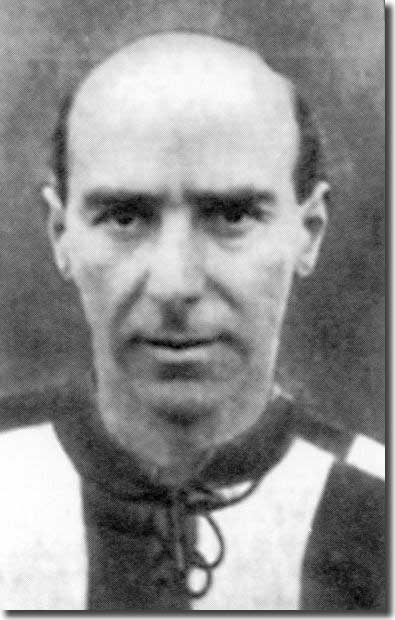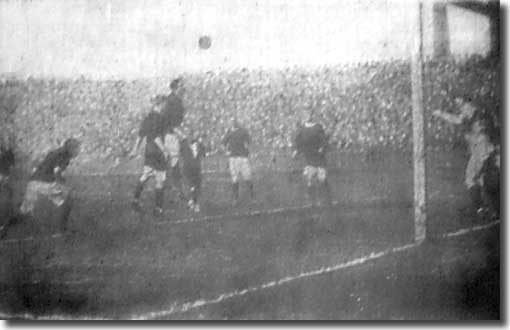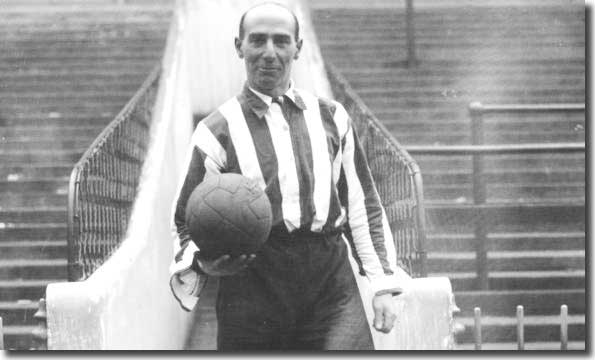 Billy Gillespie was an all time Irish great and it was astonishing
that Leeds City should allow him to slip through their fingers; they sold
him to Sheffield United for a club record £400 in the run up to Christmas
1911 to ease their financial problems.
Billy Gillespie was an all time Irish great and it was astonishing
that Leeds City should allow him to slip through their fingers; they sold
him to Sheffield United for a club record £400 in the run up to Christmas
1911 to ease their financial problems.
According to Ivan Sharpe, Gillespie's 'generalship and captaincy for
Ireland exceeded even his successes with Sheffield United. An easy going
inside-left of straightforward methods, Gillespie had the golden gift
of piercing a defence with one long, accurate pass.'
William Ballantrae Gillespie was born in Kerrykeel, Donegal, on 6 August
1891, the son of a policeman. After demonstrating his talents in local
junior football, he was signed up by Derry Institute when just 17.
In May 1910, Gillespie was about to join Linfield when Leeds City secretary-manager
Frank Scott-Walford, scouting
for players in the Emerald Isle, persuaded him instead to cross the
water and sign professional forms for the English Second Division outfit.
Scott-Walford had been alerted to his talents earlier, when watching
him score twice in a junior international match against Scotland at
Celtic Park.
Gillespie and countryman Joe Enright were
given rave reviews after their displays in pre-season warm ups, Gillespie
netting a hat trick in the contest between the Whites and the Stripes.
Both men were given debuts in the opening game against Blackpool on
3 September, with Gillespie leading the attack. Billy McLeod, the regular
centre-forward, who had been injured, returned the following week at
Gillespie's expense. The Irishman scored a hat trick in the reserves
and was back at centre-forward on September 24, with McLeod switching
to inside-right for the match at Huddersfield. With Hugh
Roberts on the right flank, Enright at inside-left and Fred Croot
outside him, that same forward line played unchanged for nine games.
Gillespie opened his scoring account for City in the 1-1 draw with
Birmingham at Elland Road on October 1. He fired past the keeper early
on after a move which he had started in his own half.
That goal set him off on a scoring spree and Gillespie scored seven
times in the following eight games, including braces against Gainsbrough
and Stockport in 4-0 victories.
For all that, the Irishman was not without his critics and after a
3-3 draw with Chelsea on Boxing Day, he was dropped to allow McLeod
to resume at centre-forward. He appeared only twice more all
season.
After playing in the first four games of 1911/12,
Gillespie was left out again and only played two more matches for City,
against Burnley and Wolves in December. On both occasions, Leeds shipped
five goals. Gillespie scored from a penalty in the first game, when he
was rated the Peacocks' outstanding forward.
On 22 December, the Yorkshire Post broke the news that the Irishman would
be leaving Elland Road.
back to top
'We are informed by Mr Scott-Walford, the Leeds City manager, that he
has transferred W Gillespie to Sheffield United at what is stated to be
a record fee for the Leeds City club. Gillespie has been regarded as one
of the most useful of the Irish brigade at Elland Road. He was secured
from the Londonderry Guild club at the beginning of last season, and has
played regularly with Leeds City either in the centre-forward or inside-left
position. He has played with such success in the latter position that
his transfer in the present critical state in the club's affairs may occasion
surprise, but ... the management felt, in the circumstances, that they
could not reasonably refuse Sheffield United's offer for his transfer.
'In reality the transfer has been forced by the trend of recent events.
Gates of late at Elland Road have not been sufficient to pay the ordinary
expenses of the club, and when Sheffield United weighed in with what is
stated to be a bigger fee than has ever before been paid for the transfer
of a Leeds City player, the management felt that the interests of the
club demanded its acceptance. We have reason to believe that the fee is
something approaching or something exceeding £400 and if that be so the
acceptance of Sheffield United's cheque will go some way towards tiding
over Leeds United's financial embarrassments.'
The additional funds might have eased City's financial difficulties,
but it was a massive error of judgement on the club's behalf; Gillespie
went on to prove himself one of the outstanding Irish talents of all
time, enjoying a 20-year career at Bramall Lane and scored over 130
goals in nearly 500 games.
Gillespie made his international debut in February 1913, scoring twice
as Ireland achieved their first ever victory over England. A year later
he was a member of the first Irish team to secure the Home International
Championships when they won two and drew one of their three games. He
enjoyed incredible success for Ireland against  England and seven of
his 13 international goals came against the Irish. That international
goal haul set an Irish record which stood until 2004 when David Healy
took his international total to 14. Gillespie won 25 Irish caps.
England and seven of
his 13 international goals came against the Irish. That international
goal haul set an Irish record which stood until 2004 when David Healy
took his international total to 14. Gillespie won 25 Irish caps.
He quickly established himself as a stalwart of the Sheffield United
side, becoming their midfield playmaker and proving himself an outstanding
ball player.
He missed the Blades' FA Cup triumph in 1915 when he was out with a broken
leg, but received a winner's medal ten years later when he captained them
to victory in the final against Cardiff City. Ivan Sharpe: 'Never has
Gillespie's generalship been more marked. No player on view trapped the
ball so surely, retained it with such good judgement, and exhibited such
power and precision in sending it either to the left or right wing or
more delicately down the middle. Sheffield United played wonderfully well
but special praise is due to Gillespie, the man who waves a wand and whose
influence has played such a vital part in United's capture of the Cup.'
He remained with United until 1932, when he returned to Ireland for
a nine-year spell as manager of Derry City. As part of the deal taking
him back to Ireland, Gillespie had to take a red and white team strip
with him and Derry adopted the colours.
He led Derry to two City Cup triumphs and on four successive occasions
they finished runners up in the Irish League.
Gillespie left Derry City in 1941 and relocated to Bexley in Kent,
where he died a month short of his ninetieth birthday in July 1981.
back to top











 Billy Gillespie was an all time Irish great and it was astonishing
that Leeds City should allow him to slip through their fingers; they sold
him to Sheffield United for a club record £400 in the run up to Christmas
1911 to ease their financial problems.
Billy Gillespie was an all time Irish great and it was astonishing
that Leeds City should allow him to slip through their fingers; they sold
him to Sheffield United for a club record £400 in the run up to Christmas
1911 to ease their financial problems.
 England and seven of
his 13 international goals came against the Irish. That international
goal haul set an Irish record which stood until 2004 when David Healy
took his international total to 14. Gillespie won 25 Irish caps.
England and seven of
his 13 international goals came against the Irish. That international
goal haul set an Irish record which stood until 2004 when David Healy
took his international total to 14. Gillespie won 25 Irish caps.